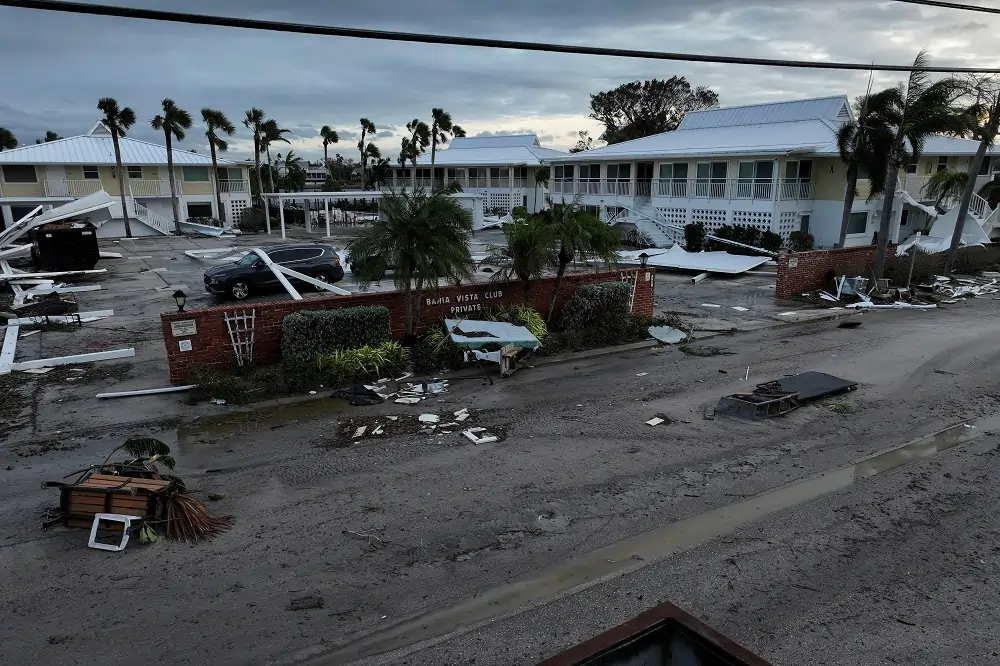
By Leonara LaPeter Anton and Brad Brooks
ST. PETERSBURG, Florida (Reuters) -Hurricane Milton plowed into the Atlantic Ocean on Thursday after cutting a destructive path across Florida that spawned more than a dozen tornados, destroyed homes and killed at least four people, but the storm did not trigger the catastrophic surge of seawater that was feared.
Governor Ron DeSantis said the state had avoided the worst-case scenario, though he cautioned the damage was still significant. The Tampa Bay area appeared to have escaped the storm surge that had prompted the most dire warnings.
The four deaths occurred in St. Lucie on Florida’s east coast, with at least two of those in the Spanish Lakes Communities, a set of retirement neighborhoods, when multiple twisters touched down on Wednesday afternoon, county spokesperson Erick Gill said. It was unclear whether the other two fatalities were at Spanish Lakes, he said.
There were 19 confirmed tornados in Florida as of 8 p.m. Wednesday, about the time Milton made landfall, DeSantis said. Some 45 tornados were reported throughout the day, mostly in the central and eastern parts of the state, the National Weather Service said.
More than 3 million homes and businesses in Florida were without power on Thursday morning, according to PowerOutage.us. At least some of them had been waiting days for power to be restored after Hurricane Helene hit the area nearly two weeks ago.
The hurricane tore a gaping hole in the fabric roof of Tropicana Field, the stadium of the Tampa Bay Rays baseball team in St. Petersburg, but there were no reports of injuries. The ballpark was a staging area for responders, with thousands of cots set up on the field.
“One of the blessings for us is that we did not see that predicted storm surge. That saved a lot,” Tampa Mayor Jane Castor said during an early morning press conference.
In the Tampa area, the storm toppled trees, threw debris across roadways and downed power lines, video footage from local news showed. Some neighborhoods were flooded, but the extent of the damage will not be known until crews can assess the destruction, Castor said.
Steven Cole Smith, 71, an automotive writer and editor who lives in Tampa about seven miles (11 km) from the Gulf Coast, rode out the storm with his wife. He said the wind shook the windows so hard he thought they would shatter.
“We really didn’t have anywhere else to go,” Smith said of their decision not to follow evacuation orders. He has a house in central Florida, but thought the forecast for that area was as bad as where he was staying.
“I spent yesterday scavenging for supplies, fuel for the generator, everything we’d need,” he said. “I have a chainsaw too.”
Luckily, he said, Tampa was spared a direct hit.
Emergency crews responded overnight to dozens of calls for help, including one in which 15 people including children were rescued after a tree fell on top of a house, Tampa Police Chief Lee Bercaw said.
The winds toppled a large construction crane in St. Petersburg, sending it crashing onto a deserted street.
The state was still in danger of river flooding after up to 18 inches (457 mm) of rain fell. Authorities were waiting for rivers to crest, but so far levels were at or below those after Hurricane Helene two weeks ago, Castor said on Thursday morning.
Most of the damage reported so far stemmed from the tornados, according to Federal Emergency Management Agency head Deanne Criswell, who was in Tallahassee on Thursday. Sarasota County, the area just south of Tampa where Milton made landfall, suffered the most storm surge, Criswell told MSNBC.
“The evacuation orders saved lives,” she said, noting that more than 90,000 residents went to shelters.
‘INSTANTANEOUS’
In Fort Myers on the southwest coast, resident Connor Ferin surveyed the wreckage of his home, which had lost its roof and was full of debris and rainwater after a tornado hit.
“All this happened instantaneous, like these windows blew out,” he said. “I grabbed the two dogs and run under my bed and that was it. Probably one minute total.”
The storm hit Florida’s west coast on Wednesday night as a Category 3 hurricane on the five-step Saffir-Simpson scale, with top sustained winds of 120 mph (205 kph). While still a dangerous storm, Milton had weakened from the rare Category 5 status as it trekked over the Gulf of Mexico toward Florida.
Milton tailed off further as it crossed land, dropping to a Category 1 hurricane with top sustained winds of 85 mph (145 kph) as it reached the peninsula’s east coast, the National Hurricane Center said. By Thursday morning, the storm was moving away from the Florida Atlantic coast after lashing communities on the eastern shoreline.
The eye of the storm hit land in Siesta Key, a barrier island town of some 5,400 people off Sarasota about 60 miles (100 km) south of Tampa Bay.
Tornados caused damage in numerous counties and destroyed around 125 homes, mostly mobile homes, the governor said.
St. Lucie County Sheriff Keith Pearson estimated 100 homes were destroyed in the county where some 17 tornadoes touched down, NBC reported.
In a state already battered by Hurricane Helene two weeks ago, as many as 2 million people had been ordered to evacuate ahead of Milton’s arrival, and millions more live in the storm’s path.
Much of the southern U.S. experienced the deadly force of Helene as it ripped through Florida and several other states. Both storms are expected to cause billions of dollars in damage.
As of Thursday morning, 2,209 U.S. flights had been canceled, according to flight-tracking website FlightAware, with the highest number of cancellations from Orlando, Tampa and southwest Florida.
Florida airports remained closed on Thursday, including Tampa, Palm Beach and St. Pete-Clearwater, with exceptions for emergency aircraft, according to the Federal Aviation Administration.
(Reporting by Brad Brooks in Orlando and Leonora LaPeter Anton in St. Petersburg; Additional reporting by Julio-Cesar Chavez, Evan Garcia, Rich McKay, Brendan O’Brien, Susan Heavey, Ashitha Shivaprasad, Shubham Kalia and Daksh GroverWriting by Toby Chopra and Joseph Ax; Editing by Frank McGurty, Sharon Singleton and Rod Nickel)


